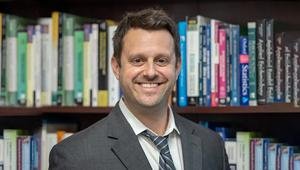image:
Dr. Matthew Lee Smith
Show more
Credit: Steven Arnold/Texas A&M University School of Public Health
Texas A&M University School of Public Health and USAging have received the 2024 Immunization Regional Champion Award from the U.S. Centers for Disease Control and Prevention’s National Adult and Influenza Vaccination Summit. Matthew Lee Smith, PhD, professor in the School of Public Health, leads the school’s efforts as a founding member of USAging’s Elderly and Disabled Vaccination Collaborative (ADVC).
The honor, announced as respiratory disease season is in full swing in the United States, recognizes Smith’s work in supporting ADVC’s efforts to increase the number of seniors and people with disabilities receiving vaccinations against influenza, COVID-19, pneumococcal disease, shingles and respiratory syncytial virus (RSV).
“Vaccination has been one of the major public health breakthroughs that has increased life expectancy and overall health for all age groups,” Smith said, “but we know there are many underserved communities and population subgroups that are at increased risk of contracting harmful viruses and diseases that can lead to serious health outcomes, hospitalizations and premature death. Older adults are at higher risk of these outcomes and need to be protected.”
Smith is the principal investigator on the $1.1 million grant from USAging. The grant is part of a larger $75 million grant provided by the Office of Community Living (ACL) and the U.S. Department of Health and Human Services (HHS) to support USAging’s ADVC. The funds cannot be used to purchase vaccines. Instead, the School of Public Health will use the funds to support educational outreach and community vaccination events in underserved and undervaccinated areas, with an emphasis on outreach to Hispanic/Latino and rural communities.
“We need dedicated efforts to ensure that seniors, especially those who can’t afford it, are aware of the vaccines they need, their eligibility and where they can get vaccinated for free or at low cost,” Smith said.
The 18-month state effort, which began on September 1, 2023, employs a community navigation approach and engages a network of community health workers and promoters and strategic partners. Promoters are trusted frontline public health workers who strive to improve the health status of their communities through education, social support and advocacy.
“To effectively address a public health issue, communities need to work together,” Smith said. “This is especially important when trying to serve traditionally under-vaccinated communities who, unfortunately, don’t necessarily attend clinics or seek out preventive care.”
Strategic partners in the Texas Project are the Brazos County Health Department, the South Texas Promoters Association, and the Intercultural Center for Health, Research and Wellness. Additional partners include the School of Public Health’s Center for Community Health and Aging, Center for Health Equity and Evaluation Research, and Aggies Serving the Aging Population, a student group at Texas A&M University. These groups are hosting vaccination availability events and facilitating support services to remove barriers to vaccination, such as transportation, appointment assistance and general community guidance.
As a result of these ongoing efforts, the Texas effort has administered a total of 6,604 vaccine doses and project partners have engaged with approximately 78,000 people through 99 community events and 43 outreach and education activities.
Smith has also served as a subject matter expert for ADVC, which engages approximately 300 grantees who work with area agencies on aging issues, independent living centers, and other community-based organizations across the country with a network of more than 1,400 partner organizations. In this role, the Texas A&M University professor has provided training to the grantee network on vaccination-related topics, including communication strategies, conflict mitigation, multicultural marketing, and community navigation strategies.
Since May 2023, ADVC partners have administered more than 378,000 COVID-19 and influenza vaccinations. Additionally, ADVC partners have administered 112,000 RSV, shingles, pneumococcal, and other vaccinations. They also provided support services to 441,000 people, including transportation to vaccination clinics, assistance with appointments, and referrals to senior and disability resources.
Dorian Martin, Texas A&M University School of Public Health
###
Disclaimer: AAAS and EurekAlert! are not responsible for the accuracy of news releases posted to EurekAlert! by contributing institutions or for any use of information provided through the EurekAlert system.

